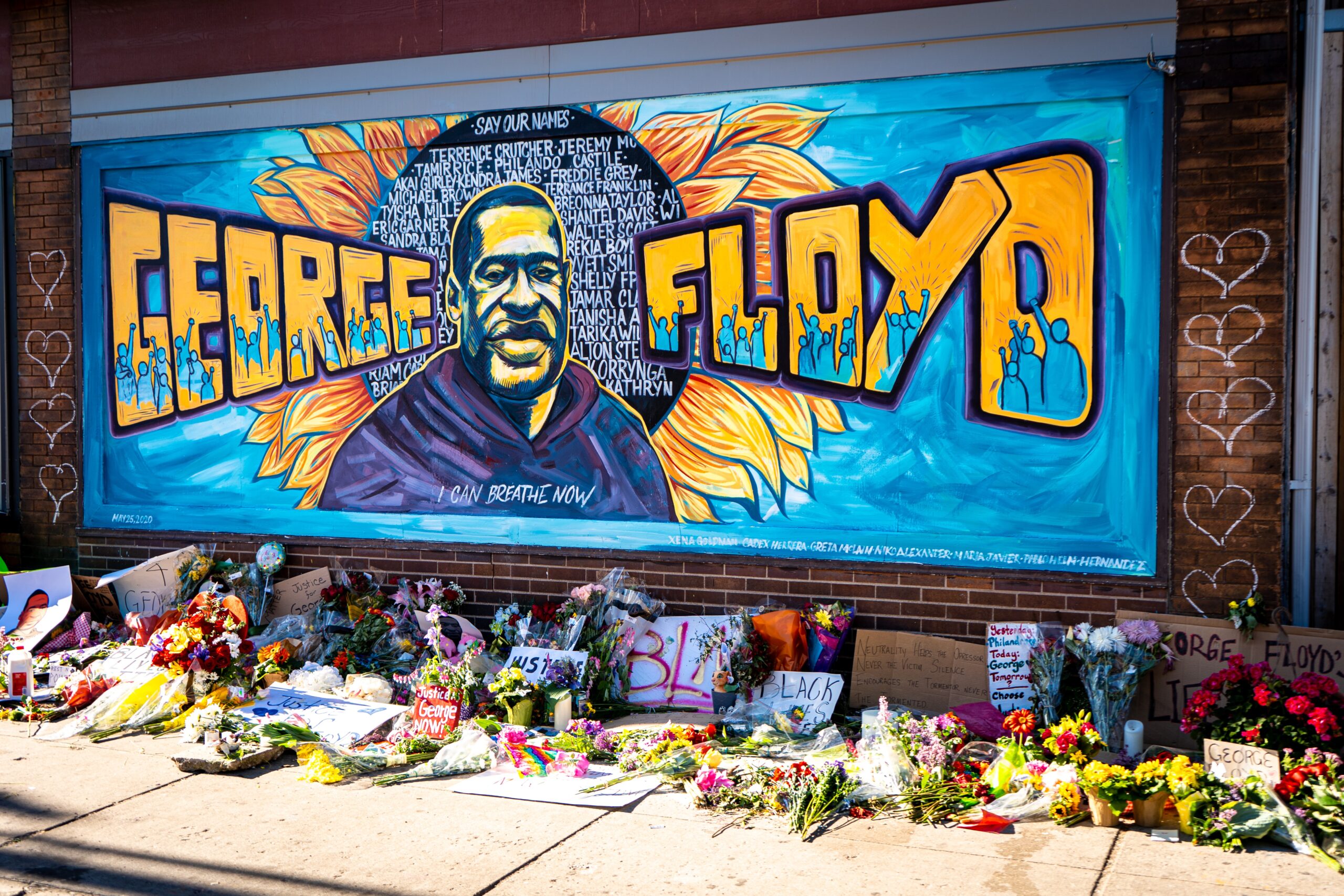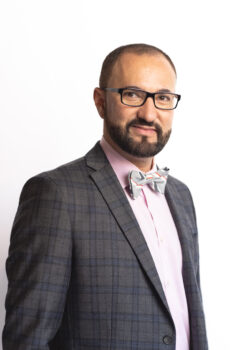
It’s something like that wound on a part of your body you never realized how much you used until it was hurt. Not only does it hurt, but because of its location on the body, the wound risks reopening and additional pain due to consistent stress. Racism is America’s laceration, and the Derek Chauvin trial is one of [too] many moments that rears us to this deeply embedded wound.
Though we did not personally know George Floyd, the events that lead to his death have deeply impacted many of us. On Tuesday, May 25th, 2020, former Minneapolis, MN police officer Derek Chauvin enacted extensive force by kneeling on the neck of George Floyd in an attempt to “subdue” him – ultimately leading to his death. The uproar of rage in many communities actively catalyzed social justice to be sought for George Floyd – and other Black / African Americans that have fallen victim to systemic racism.
Derek Chauvin currently stands trial facing two murder charges (2nd Degree – Unintentional and 3rd Degree Murder). He is also charged with 2nd Degree Manslaughter; which can carry a ten year sentence if convicted.
The significant impact of George Floyd’s death and the trial of Derek Chauvin can trigger anxiety, PTSD and trauma for many people.
What does being an ally to People of Color (POC) look like?
With white supremacy being a white problem, white people need to not merely standby when prejudice, discrimination and racism occurs, but to step up, speak out, and heal learned generational fear and hatred. It only takes one person to set an exemplary tone of advocacy in every given moment.
Here’s how IntraSpectrum Counseling’s own clinicians are guiding others while simultaneously processing through their own emotions during this challenging time.
Dr. Leesa Contorino, PsyD-L (she/her/hers)
As a white person with white family members and having grown up in a predominantly white area of the north east, it is all too common for trials and events related to racial injustice to bring out the worst in folks who look like me, typically in the form of white supremacist rhetoric. Taking the time to respond to and challenge this rhetoric is vital for white folks who value racial justice. While many young folks have taken to social media to express their feelings about the trial, I have tried to be mindful of my social media postings, taking care in not posting graphic images of black bodies being harmed, as to not re-traumatize BIPOC folks online – who are all too aware of this type of violence.
We also must remember that social media postings are not enough. For those living in Chicago, your local mutual aid group may be a great place to start to increase your involvement in challenging social inequality on a local level. However, before we as white folks insert ourselves into spaces predominantly comprised of BIPOC folks, we must ask ourselves, ‘what is my motivation?’ And continuously examine our own internalized white supremacy by remaining open to feedback on how we may be harming others. For those interested in further understanding how white supremacy can and is being perpetuated today, might I suggest, “The New Jim Crow” by Michaelle Alexander or “White Fragility” by Robin DiAngelo?
As for the trial itself, all people watching need to allow themselves space to disconnect from media about the trial and be mindful of how re-watching images of George Floyd’s murder could lead to re-traumatization. Taking care of yourself throughout the trial might look like choosing to read about the trial rather than watching it live, limiting the time you spend consuming media about the trial, or holding space with others to process reactions to trial updates.
How can allies in need of support find grounding?
For white folks looking for support, we must remember that our Black / African American peers may not have space to process their feelings, nor should we expect to have our feelings centered in conversations about the trial’s impact. I have been known to turn on an episode of Bob’s Burgers to ground myself, self soothe after feeling emotionally raw following too many hours of binge watching the news.
In times of high stress, many of us can forget about the things and activities that are the foundation of our self-care, whether it be a warm shower, a hot meal, or quiet time with your animals. This is the time to intentionally reconnect with these things, not to avoid the horrifying events we have witnessed, but to have the energy to continue being aware of the state of the country in which we live, and having the space to show up in ways to continue challenging racial injustice.
Mario Alvarez Serrano, MA, LCPC, NCC (he/him/his)
Being a marginalized person is an identity. “Ally” is a verb, not an identity. Perhaps the simplest way to care for ourselves while the Derek Chauvin trial unfolds is by intentionally synchronizing our thoughts and actions in ways that instill self-love while standing in solidarity with people of marginalized identities.
Now some of us can switch between being the marginalized person to acting like an ally. But for BIPOC people, during painful moments of experiencing vicarious trauma or racialized re-traumatization, it is not a privilege that they can psychologically insulate themselves from in ways that allies can. Black people watching this case are concerned about what happened to George Floyd but are also concerned whether they are safe in a world that does not see Black people as worthy of justice – all of which inevitably exacerbates trauma based on identity. Which is the core foundation of one’s very own Existence.
What are some ways the effects of trauma may present?
When people experience racial trauma or even vicarious trauma, the effects are not only mental – indeed they can present a host of challenges that simultaneously affect the body. Symptoms of vicarious or secondary trauma include feeling emotionally numb or shut down, difficulty managing emotions, experiencing fatigue, sleep disturbances, flashbacks or intrusive memories, physical problems, or complaints, such as aches, pains, and decreased resistance to illness.
As allies we can all commit to use our privileges to end racism because racism ultimately hurts all of us. It begins by making it our mission to dismantle silent, yet oppressive systemic racism and commit to acting as if we ourselves are part of the marginalized people. Think as if your very own freedom of identity is at stake; additionally, work through trauma on the societal level by not giving up on the search for truth and seeking justice. Social justice is not just about punishing wrongdoing; it is also about mitigating harm. If you’re looking to be more involved and connected to a network of groups and individuals where undermining white supremacy is the collective goal, I suggest checking out “Showing Up for Racial Justice” (SURJ) here.
Mario provides these 5 self-care tips to help ground yourself, when triggering moments and re-traumatizations come up:
FEEL YOUR FEELINGS
Give yourself permission to access and hold whatever feelings you are experiencing at any given time. Resist judging yourself for having certain feelings that perhaps you would rather avoid. Pushing negative feelings away avoids us from processing them and ultimately healing. Tap into your feelings and allow them to be present in order to find healthy ways to nurture any negative feelings. Remember to prioritize Maslow’s basic human needs – food, safety, shelter, sleep, air, water, clothing.
CONNECT WITH OTHER AFFIRMING PEOPLE
Many BIPOC cultures emphasize taking care of others as a higher value than prioritizing taking care of ourselves. This can leave many of us feeling guilty or shameful if we carve out “me time.” I encourage all my clients to give themselves permission to prioritize time just for themselves, free of internal and external unnecessary harmful judgments.
RECOGNIZE YOUR MEDIA CONSUMPTION TOLERANCE
Black / African Americans can engage in intentional self-care by limiting consumption of the trial, setting boundaries with trial discussions, and seeking out spaces that will positively affirm racial identity. While identity politics are personal, the trial may trigger a retrieval of dependent memories of own lived negative experiences with law enforcement. You can easily do this with content control: for example, change your social media settings to control the autoplay of video feeds. Consider also unplugging from social media altogether to help ease angst and anxiety. Knowing and recognizing when social media causes distress and makes us feel worse about ourselves is critical to identify that maybe we are better off disengaging/pausing for a while.
ADHERE TO YOUR OWN BOUNDARIES
It is imperative to set boundaries via who, how, and when you can or cannot engage in discussions regarding the trial. Emotionally difficult conversations must be entered in good-faith and with mutual genuine respect as a foundation. Otherwise, these difficult, but often necessary conversations can be more harmful than helpful.
SEEK THERAPY
Consider having your own therapeutic healing space to explore, process, and reflect on intentionally living your life with purpose and meaning. Professionally, it is my honor to be of service to others seeking their own therapeutic safe space to accomplish their goals.
Overcoming trauma – and limiting future traumatic experiences – requires telling the truth about these tragedies, recognizing and acknowledging trauma’s role, and understanding the unconscionable killing of George Floyd (plus countless other Black and Brown lives killed by law enforcement officers) is connected to the discrimination that people of color face – hiring and the overall workforce, accessing health care; it is a horrific reminder that an encounter with a police officer may ultimately lead to death. Real advocacy means working creatively and collaboratively to find the root of repetitive harm, especially racial harm. We are all capable of holding ourselves to higher levels of empathy. By accessing our empathy, hopefully we can all show up for social, legal, and global racial justice.
While open wounds have the ability to heal themselves over time, some cuts are not so minor and need tending to, in order for proper healing to take place. The cuts of racism continue to reopen, and these wounds are leaving their scars in diverse communities, in countless ways. Deep and proper healing can and needs to happen. It is an effort to be made collectively. IntraSpectrum Counseling is Chicago’s leading psychotherapy practice dedicated to the LGBTQ+ community, and we strive to provide the highest quality mental health care for multicultural, kink, polyamorous, and intersectional issues. For anyone needing affirming and validating support in their healing, please click here or email us at help@intraspectrum-chicago.com.







 Today, July 26th, is National Disability Independence Day. This annual commemoration marks the day in 1990 when the Americans with Disabilities Act (ADA) was signed into law. The ADA enshrined several crucial civil rights protections for individuals with disabilities, but it still falls short of its intended goals after over 30 years on the books.
Today, July 26th, is National Disability Independence Day. This annual commemoration marks the day in 1990 when the Americans with Disabilities Act (ADA) was signed into law. The ADA enshrined several crucial civil rights protections for individuals with disabilities, but it still falls short of its intended goals after over 30 years on the books.